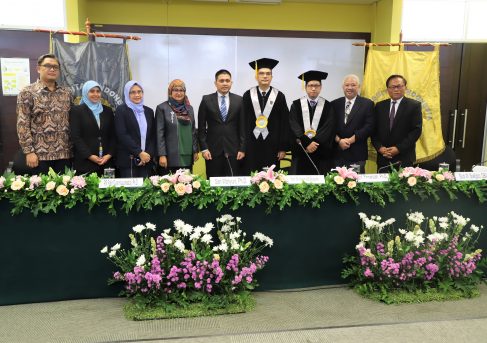Harry Patria Researches the Influence Factors of the Success of Project Initiation Decisions in the Oil, Gas Midstream and Downstream Sectors
Nino Eka Putra ~ Humas FEB UI
DEPOK – Postgraduate Management Program in the Faculty of Economics and Business, University of Indonesia held an open session of Doctoral Promotion of Harry Patria (1606940061) which took place in the Postgraduate Auditorium, Postgraduate Building, on Wednesday (1/15/2020).
The Doctoral Promotion Session was chaired by Prof. Dr. Irwan Adi Ekaputra, with his supervisor, Sari Wahyuni, Ph.D. (Promoter), RR. Ratih Dyah Kusumastuti, Ph.D. (Co-Promoter). As the testing team, Prof. Firmanzah, Ph.D. (Chief Examiner), Budi W. Soetjipto, DBA, Dr. Manerep Pasaribu, Riani Rachmawati, Ph.D., and Vid Adrison, Ph.D.
The dissertation raised was titled “Determinants Factors Affecting Successful Project Initiation Decision: Empirical Evidences in Indonesia Oil and Gas Midstream and Downstream Sector”. Project initiatives initiated by management (top-down approach) and project teams (bottom-up approach). Management generally uses the first approach, which tends to go through a political process involving power, interests, and authority.
On the other hand, the second approach tends to be more dynamic in situations where there is an interest between management and the project team. Effective decision making at the beginning of the project becomes more challenging. This study aims to contribute to previous studies by exploring the influence and management and project teams on the decision making process by the project leader-whether the process tends to use a rational, intuitive or political approach.
The questionnaire was prepared by selecting the project leader (PIC) who was responsible for project or business planning. Data is used to test hypotheses in the research model constructed using structural equation modeling (SEM) tools with SPSS and AMOS. Along with the questionnaire, interviews with selected respondents were also carried out.

“The study’s findings reveal different pathways in achieving successful project initiation. Management uses decision making processes with procedural rationality and intuition,” said Harry Patria.
On the other hand, the project team uses the decision making process of procedural rationality and constructive politics. It turns out that management and the project team use procedural rationality. “From this significant path, the study results show a critical trajectory in achieving successful project initiation by increasing the diversity of project teams and the use of decision making based on constructive politics,” he added.
Therefore, there is a paradox of participation because the bottom-up project is determined by the two parties, namely the aspirations of the project team and management expectations. Thus, organizations should encourage the diversity of project teams that influence the political decision-making process through negotiations taken by the project leader.
“From this research typology, effective decisions can be achieved by increasing the diversity of the project team and constructive political decision making. By understanding the crisis path to reach optimal decisions, the organization and project leaders can increase the success of project initiation. In the long term, this can contribute to the realization of investment in the Indonesian oil and gas sector,” he concluded.
Thus, the Leadership Council of the open session of doctoral promotion decided, Harry Patria (1606940061) was declared to graduate with the title of Very Satisfactory and succeeded in obtaining his 283th Doctorate in Strategic Management. Congratulations to Dr. Harry Patria! (Des)














